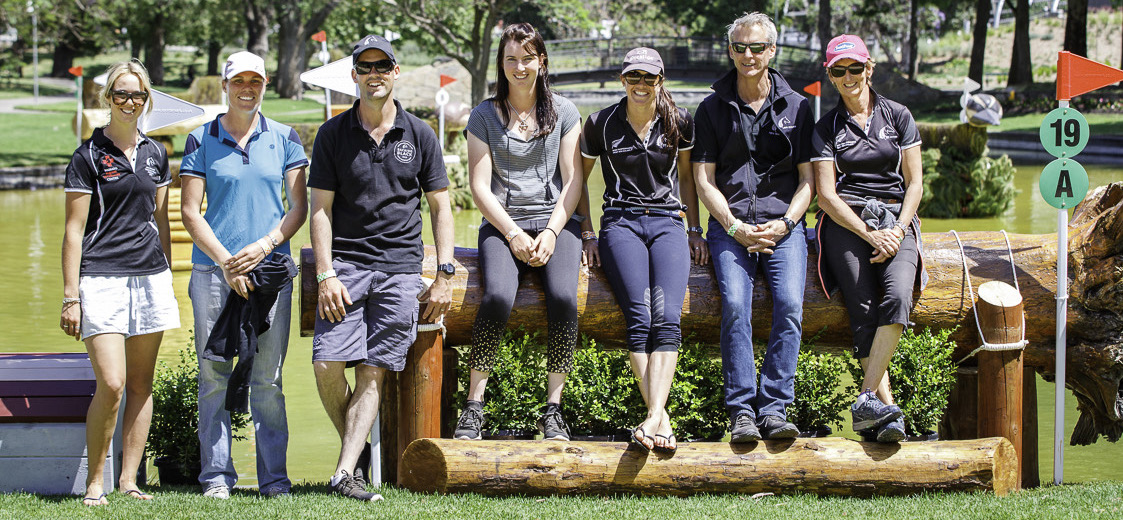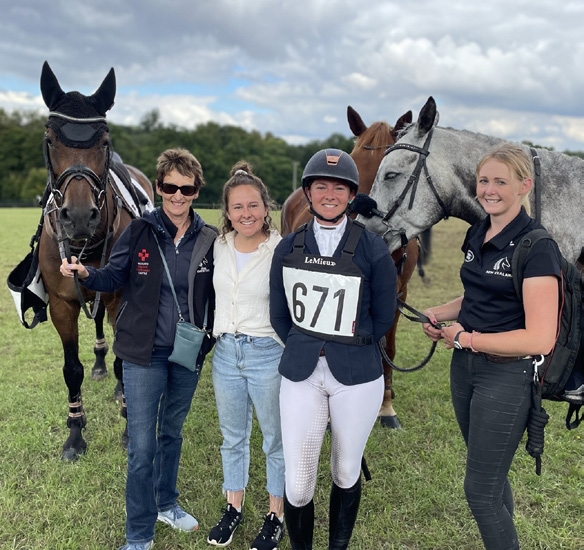Penny Pearce
Penny Pearce
- Coach Profile
Equestrian Sports NZ
Penny Pearce (nee Castle) has worn many hats in a long and decorated equestrian career. She has successfully juggled competing and coaching while holding significant managerial positions in the high-performance space without missing a beat.
In a natural progression from growing up on the family’s steep hill-country farm near Pahiatua, north of Masterton, where horses were the main mode of transport, Pearce’s destiny was forged when they first put on a horse as a three-year-old.
That was over 50 years ago, and the multi-faceted Pearce has since continued to leave a considerable mark on the equestrian landscape. She has gone on to become one of New Zealand’s top dressage riders, being the first of only a handful in this country to break the magical 70% mark at the Grand Prix level after a history-making day in Hastings in 2015.
That also went hand-in-hand with being a highly sought-after coach, which involved both pure dressage riders and eventers, where dressage is a key component of the multi-disciplined event that New Zealand has become famed for. And where Pearce has coached many of New Zealand’s Olympic three-day eventing riders.
Her first involvement with coaching came at a young age through Pony Club.
“One of the jobs at Pony Club is you also have to coach,” she said. “You get called into coaching the younger people, something that happened when I was 14 or 15 when I got my B Certificate and at 17, my A Certificate and you were expected to give time back to the pony club, so that’s where my coaching started.”
After leaving college, Pearce went into nursing, which lasted a couple of years before she decided her vocation rested with horses.
“I did love nursing and at the time was also still riding full-time, but I just decided I had to follow my heart and my passion,’’ she said. “I could see a pathway where I could make money. I went overseas after I left nursing when I was 22, and when I came back, coaching became the pathway to support my sport.”
Spending time in Germany and England mainly employed as a rider, Pearce then went to America where she did a lot of competing. Having horses waiting at home to break in, Perace was drawn back to New Zealand, where her involvement and influence really took off.
“At the end of the day, I had been around the world; I loved New Zealand and thought, This is my place, and I want to be the best I can be in my own country, and that’s how I ended up back here,” she said.
“I was riding quite a high level when I came home, and people just started asking if I would start coaching, so like most coaches of 30 years ago, you start, and you learn your trade as you go along. And that’s how I started.”
After returning home, Pearce took up coaching full-time. This was initially an avenue to support her riding and competitive career, but it quickly morphed into an environment in which Pearce thrived.
“It took a little while to learn,” she said of coaching. “It was quite a mental game at the start, I can honestly say that. You grow in it, and you need to be passionate about it to do it, but I did come to really, really enjoy it. It’s still half of what
I do, and I love where I’m going with the whole managing and mentoring roles that I have now, but it’s so exciting to be able to give back in a positive way.”

More formal coaching qualifications followed and after being carded a Level 3 coach through her experience as a Grand Prix rider and coaching other riders to Grand Prix level, Pearce became the national coach for the New Zealand eventing programme when she was 27.
Getting involved with the New Zealand Academy of Sport in her early 40s opened more doors, adding to Pearce’s coaching philosophies and widening her skill base.
“That took me to another dimension where it was not so much on the technical side of coaching but more on the how to coach side of things,” she said.
“Coaching was really starting to come into play in New Zealand (early 2000s), and then in 2014, I was very fortunate to be put through the Coach Accelerator Programme (CAP). That absolutely revolutionised how I coach and provided me a huge education.”
Coaching and competing in the high-performance space simultaneously was never a problem for Pearce; instead, it had the trickle-on effect of maintaining her own performance standards.
“I just had this philosophy: the better they go, the better I have to go,” she said.
Involved with Equestrian Sports New Zealand’s (ESNZ) wider high-performance programme since 2008, Pearce’s coaching credentials and career have continued to expand while new roles, firstly as the New Zealand-based Eventing Performance Programme Manager and more recently as ESNZ’s Dressage Performance Manager, have heralded her overall value.
Playing a stronger hand on the managerial side these days, coaching and helping others upskill still plays a prominent role for Pearce.
“I still do a lot for the evening programme, and in the dressage programme, we have some very good coaches here in New Zealand,” she said. “I do coach some people in the squad but I’m trying to be very tough this time around on staying in the manager role and bringing other people in.”
“There’s more programmes available in New Zealand now and because I’ve been fortunate to go through some of them, I’m very aware of what’s out there. So, I’m creating a lot of opportunities for these coaches to go and experience what I have experienced in different programmes that High-Performance Sport is running that we weren’t pressing into.”
“There’s six or seven dressage coaches and the same numbers in eventing and showjumping, all now having these opportunities that I had after 2010 which is exciting. So, it’s there for the taking if they want it.”
Following her opportunities, Pearce is full of praise for the cross-code methods employed, which have had a huge impact on her development and progress as a coach.
“Using the cross codes in coaching has been hugely beneficial,” she said. “One of my biggest influencers was
a rugby coach from the Hurricanes who used to come and watch me coach. It wasn’t about what I delivered but more about how I delivered it and how to become a high-performance coach and not an instructional coach….there’s a lot of practice needed to change how you deliver.”
“Now for me, one of the biggest things that’s always in my head when I’m coaching is the athlete must own their own performance. They need to lead their own mistakes and go from that place, rather than micro-managing.”
A deep sense of caring about people has kept Pearce at the forefront of coaching for so long, a trait that also first took her nursing.
“It’s not just about people coming for a lesson,” she said. “I have a lot of individual clients as well as in high performance, and you do get highly involved in their lives. You realise that they’re not just a rider, and if they’re not mentally in a good place, if they’re not financially stable, if their relationships aren’t right, all that kind of stuff, they’re not going to be a good rider.”
“So, it’s all-encompassing. I really love building relationships and helping people problem-solve. That’s what I love doing, and it’s about taking the time to get to know them.”
With the increased level of expertise that has gone into all the equestrian disciplines in recent years, the depth of talented New Zealand riders continues to grow. Pearce’s highlights as a coach remain the same, being on hand to watch athletes go from the talent space and rising up to the high-performance level and compete on the world stage.
She has been a major influence on the recent successes of eventer Amanda Pottinger and dressage exponent Melissa Galloway.
Famed trainer Eric Ropiha was the earliest influence on a young Pearce when she worked at his racing stable in Woodville. He also had equestrian horses and introduced her to dressage, which became her lifeblood.
“In the coaching and leading space, the biggest influence on me would be Lyn Gunson (High-Performance Sport NZ), who has been my mentor since 2009 while going through the CAP programme was a huge moment for me,” she said.
“And the Te Hāpaitanga (High-Performance Sport New Zealand) programme, where I’ve been giving back and mentoring coaches, has really brought me to another place of how to mentor rather than coach, and that’s been a huge couple of years in that space.”
“Former New Zealand High-Performance eventing coach Eric Duvander and I spent a lot of time together through the eventing programme, and he’s also one I have a lot of respect for.”
New Zealand has one dressage spot qualified for this year’s Paris Olympic Games, and Pearce will attend as the team Chef de Mission. It is just the fifth time New Zealand has qualified an individual dressage rider for the Olympics.
The long-term goal is to qualify a dressage team from the growing talent pool in New Zealand for the 2028 Los Angeles Olympics.
